Commercial and Corporation Law: Rationale of Riba Prohibition
VerifiedAdded on 2023/04/23
|21
|7545
|495
Essay
AI Summary
This essay provides an overview of Islamic Banking & Finance and delves into the concept of Riba, which is strictly prohibited in Islam. Riba is defined as any addition to capital in loans or exchange of goods without equal counter value, often compared to usury. The essay explores the rationale behind this prohibition, citing its negative impacts on society, such as exploitation, increasing poverty, and improper utilization of resources. It highlights that Riba-based financing can lead to business failures and indebtedness, contrasting it with organic funding which promotes sustainable growth. The essay also touches upon the historical context of Riba prohibition in various religions and its modern-day interpretations, particularly within the Dawoodi Bohra community, emphasizing the ethical and moral implications of interest-based practices.

Commercial and Corporation law
Paraphrase This Document
Need a fresh take? Get an instant paraphrase of this document with our AI Paraphraser
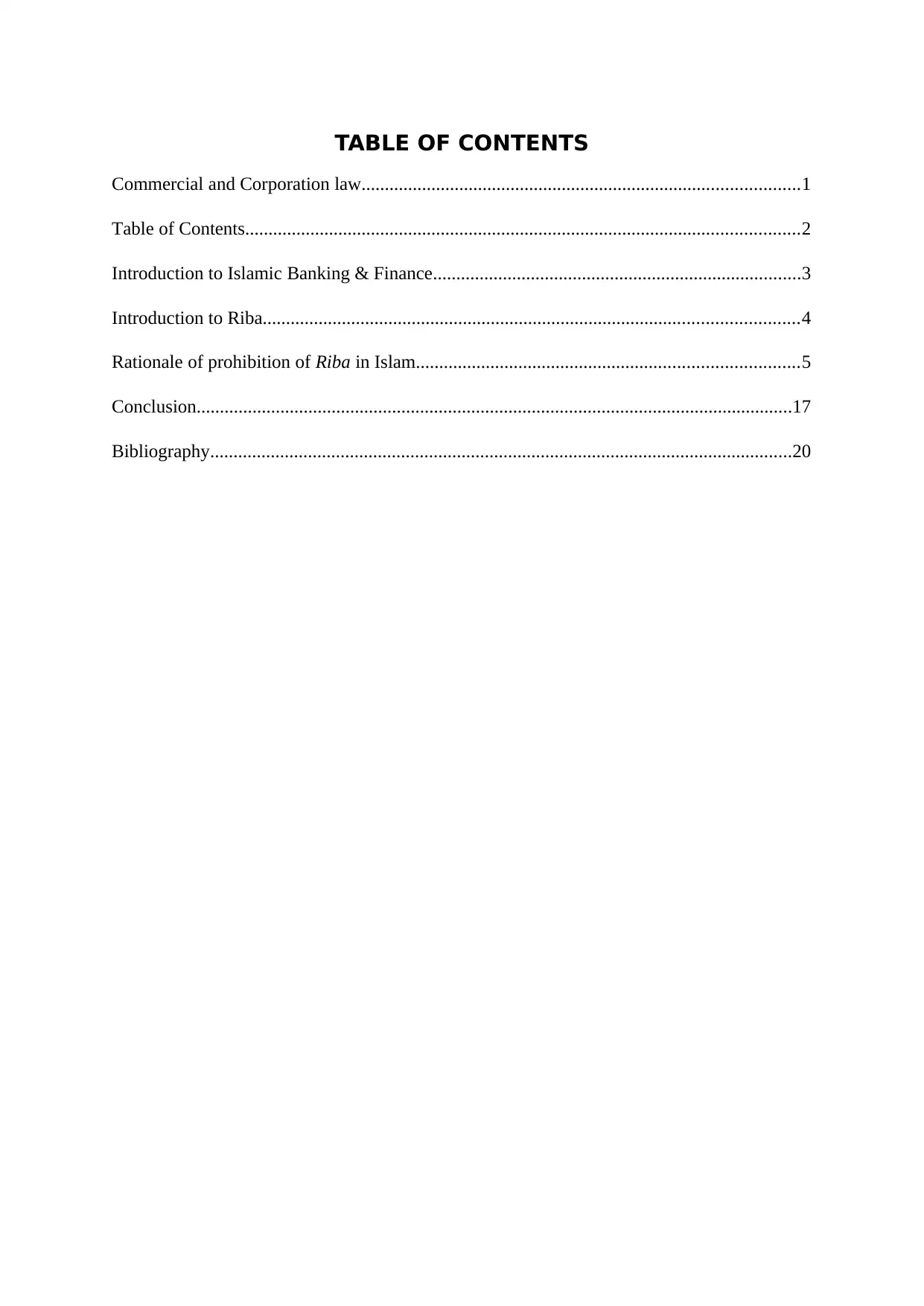
TABLE OF CONTENTS
Commercial and Corporation law..............................................................................................1
Table of Contents.......................................................................................................................2
Introduction to Islamic Banking & Finance...............................................................................3
Introduction to Riba...................................................................................................................4
Rationale of prohibition of Riba in Islam..................................................................................5
Conclusion................................................................................................................................17
Bibliography.............................................................................................................................20
Commercial and Corporation law..............................................................................................1
Table of Contents.......................................................................................................................2
Introduction to Islamic Banking & Finance...............................................................................3
Introduction to Riba...................................................................................................................4
Rationale of prohibition of Riba in Islam..................................................................................5
Conclusion................................................................................................................................17
Bibliography.............................................................................................................................20
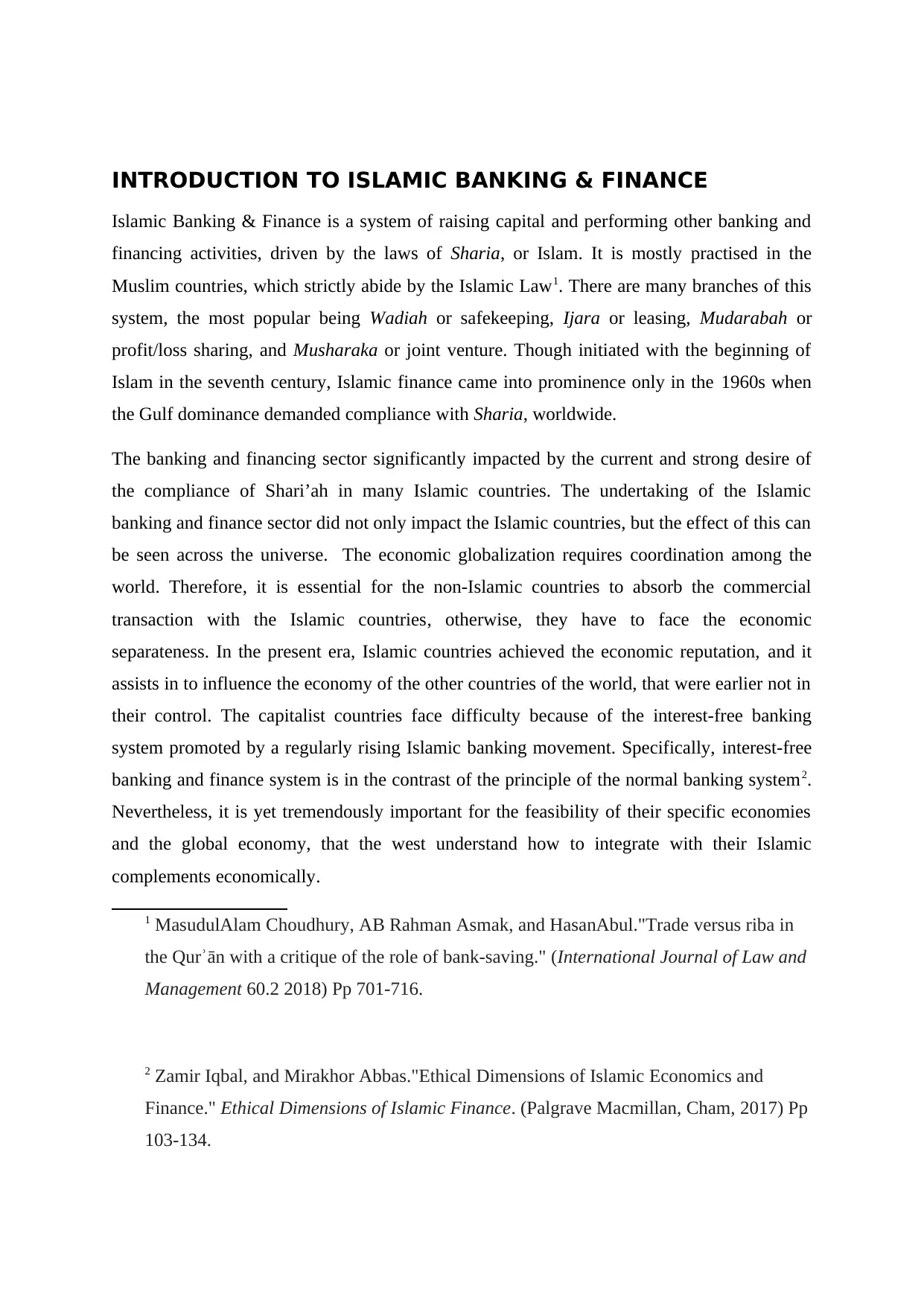
INTRODUCTION TO ISLAMIC BANKING & FINANCE
Islamic Banking & Finance is a system of raising capital and performing other banking and
financing activities, driven by the laws of Sharia, or Islam. It is mostly practised in the
Muslim countries, which strictly abide by the Islamic Law1. There are many branches of this
system, the most popular being Wadiah or safekeeping, Ijara or leasing, Mudarabah or
profit/loss sharing, and Musharaka or joint venture. Though initiated with the beginning of
Islam in the seventh century, Islamic finance came into prominence only in the 1960s when
the Gulf dominance demanded compliance with Sharia, worldwide.
The banking and financing sector significantly impacted by the current and strong desire of
the compliance of Shari’ah in many Islamic countries. The undertaking of the Islamic
banking and finance sector did not only impact the Islamic countries, but the effect of this can
be seen across the universe. The economic globalization requires coordination among the
world. Therefore, it is essential for the non-Islamic countries to absorb the commercial
transaction with the Islamic countries, otherwise, they have to face the economic
separateness. In the present era, Islamic countries achieved the economic reputation, and it
assists in to influence the economy of the other countries of the world, that were earlier not in
their control. The capitalist countries face difficulty because of the interest-free banking
system promoted by a regularly rising Islamic banking movement. Specifically, interest-free
banking and finance system is in the contrast of the principle of the normal banking system2.
Nevertheless, it is yet tremendously important for the feasibility of their specific economies
and the global economy, that the west understand how to integrate with their Islamic
complements economically.
1 MasudulAlam Choudhury, AB Rahman Asmak, and HasanAbul."Trade versus riba in
the Qurʾān with a critique of the role of bank-saving." (International Journal of Law and
Management 60.2 2018) Pp 701-716.
2 Zamir Iqbal, and Mirakhor Abbas."Ethical Dimensions of Islamic Economics and
Finance." Ethical Dimensions of Islamic Finance. (Palgrave Macmillan, Cham, 2017) Pp
103-134.
Islamic Banking & Finance is a system of raising capital and performing other banking and
financing activities, driven by the laws of Sharia, or Islam. It is mostly practised in the
Muslim countries, which strictly abide by the Islamic Law1. There are many branches of this
system, the most popular being Wadiah or safekeeping, Ijara or leasing, Mudarabah or
profit/loss sharing, and Musharaka or joint venture. Though initiated with the beginning of
Islam in the seventh century, Islamic finance came into prominence only in the 1960s when
the Gulf dominance demanded compliance with Sharia, worldwide.
The banking and financing sector significantly impacted by the current and strong desire of
the compliance of Shari’ah in many Islamic countries. The undertaking of the Islamic
banking and finance sector did not only impact the Islamic countries, but the effect of this can
be seen across the universe. The economic globalization requires coordination among the
world. Therefore, it is essential for the non-Islamic countries to absorb the commercial
transaction with the Islamic countries, otherwise, they have to face the economic
separateness. In the present era, Islamic countries achieved the economic reputation, and it
assists in to influence the economy of the other countries of the world, that were earlier not in
their control. The capitalist countries face difficulty because of the interest-free banking
system promoted by a regularly rising Islamic banking movement. Specifically, interest-free
banking and finance system is in the contrast of the principle of the normal banking system2.
Nevertheless, it is yet tremendously important for the feasibility of their specific economies
and the global economy, that the west understand how to integrate with their Islamic
complements economically.
1 MasudulAlam Choudhury, AB Rahman Asmak, and HasanAbul."Trade versus riba in
the Qurʾān with a critique of the role of bank-saving." (International Journal of Law and
Management 60.2 2018) Pp 701-716.
2 Zamir Iqbal, and Mirakhor Abbas."Ethical Dimensions of Islamic Economics and
Finance." Ethical Dimensions of Islamic Finance. (Palgrave Macmillan, Cham, 2017) Pp
103-134.
⊘ This is a preview!⊘
Do you want full access?
Subscribe today to unlock all pages.

Trusted by 1+ million students worldwide
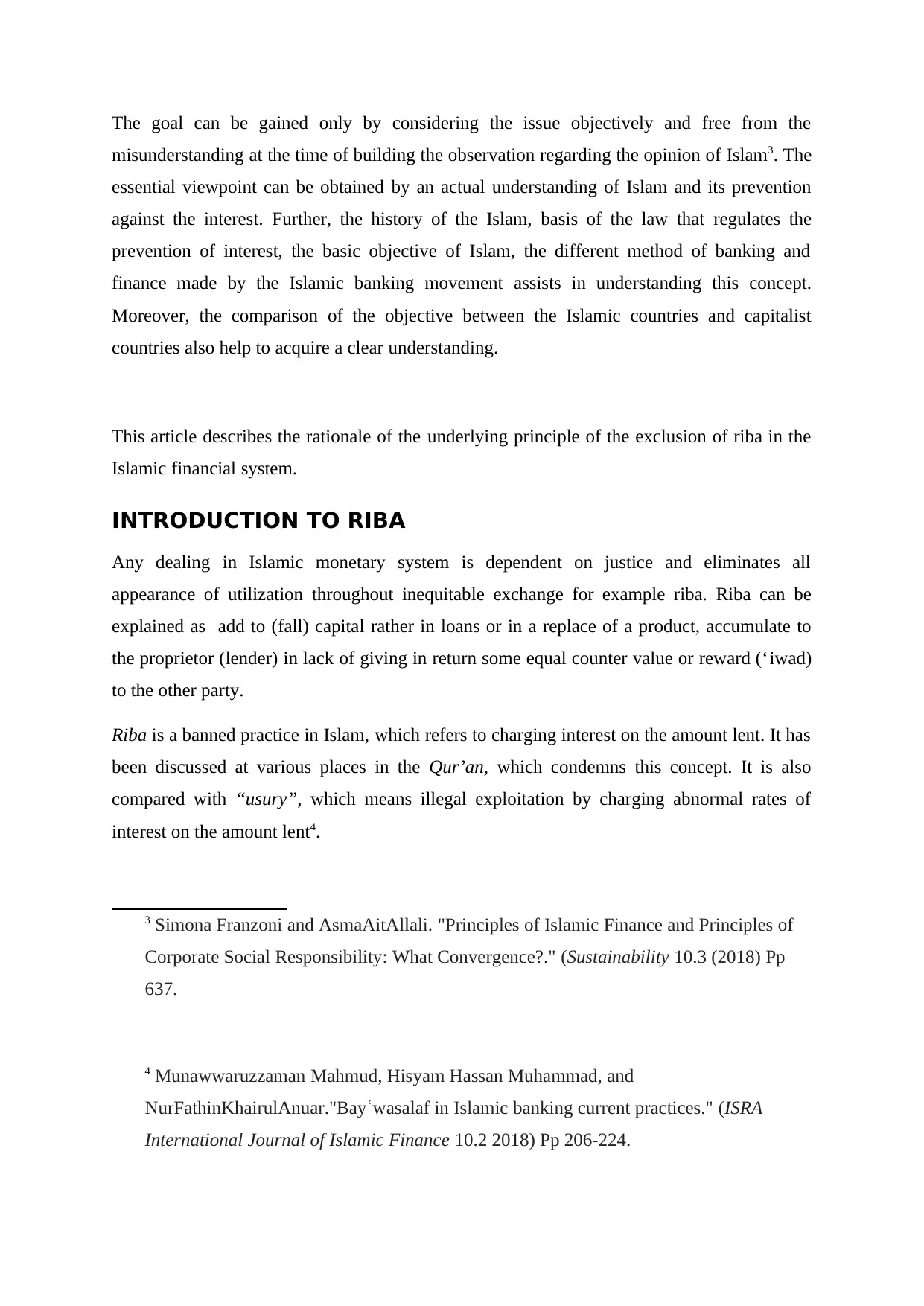
The goal can be gained only by considering the issue objectively and free from the
misunderstanding at the time of building the observation regarding the opinion of Islam3. The
essential viewpoint can be obtained by an actual understanding of Islam and its prevention
against the interest. Further, the history of the Islam, basis of the law that regulates the
prevention of interest, the basic objective of Islam, the different method of banking and
finance made by the Islamic banking movement assists in understanding this concept.
Moreover, the comparison of the objective between the Islamic countries and capitalist
countries also help to acquire a clear understanding.
This article describes the rationale of the underlying principle of the exclusion of riba in the
Islamic financial system.
INTRODUCTION TO RIBA
Any dealing in Islamic monetary system is dependent on justice and eliminates all
appearance of utilization throughout inequitable exchange for example riba. Riba can be
explained as add to (fall) capital rather in loans or in a replace of a product, accumulate to
the proprietor (lender) in lack of giving in return some equal counter value or reward (‘iwad)
to the other party.
Riba is a banned practice in Islam, which refers to charging interest on the amount lent. It has
been discussed at various places in the Qur’an, which condemns this concept. It is also
compared with “usury”, which means illegal exploitation by charging abnormal rates of
interest on the amount lent4.
3 Simona Franzoni and AsmaAitAllali. "Principles of Islamic Finance and Principles of
Corporate Social Responsibility: What Convergence?." (Sustainability 10.3 (2018) Pp
637.
4 Munawwaruzzaman Mahmud, Hisyam Hassan Muhammad, and
NurFathinKhairulAnuar."Bayʿwasalaf in Islamic banking current practices." (ISRA
International Journal of Islamic Finance 10.2 2018) Pp 206-224.
misunderstanding at the time of building the observation regarding the opinion of Islam3. The
essential viewpoint can be obtained by an actual understanding of Islam and its prevention
against the interest. Further, the history of the Islam, basis of the law that regulates the
prevention of interest, the basic objective of Islam, the different method of banking and
finance made by the Islamic banking movement assists in understanding this concept.
Moreover, the comparison of the objective between the Islamic countries and capitalist
countries also help to acquire a clear understanding.
This article describes the rationale of the underlying principle of the exclusion of riba in the
Islamic financial system.
INTRODUCTION TO RIBA
Any dealing in Islamic monetary system is dependent on justice and eliminates all
appearance of utilization throughout inequitable exchange for example riba. Riba can be
explained as add to (fall) capital rather in loans or in a replace of a product, accumulate to
the proprietor (lender) in lack of giving in return some equal counter value or reward (‘iwad)
to the other party.
Riba is a banned practice in Islam, which refers to charging interest on the amount lent. It has
been discussed at various places in the Qur’an, which condemns this concept. It is also
compared with “usury”, which means illegal exploitation by charging abnormal rates of
interest on the amount lent4.
3 Simona Franzoni and AsmaAitAllali. "Principles of Islamic Finance and Principles of
Corporate Social Responsibility: What Convergence?." (Sustainability 10.3 (2018) Pp
637.
4 Munawwaruzzaman Mahmud, Hisyam Hassan Muhammad, and
NurFathinKhairulAnuar."Bayʿwasalaf in Islamic banking current practices." (ISRA
International Journal of Islamic Finance 10.2 2018) Pp 206-224.
Paraphrase This Document
Need a fresh take? Get an instant paraphrase of this document with our AI Paraphraser
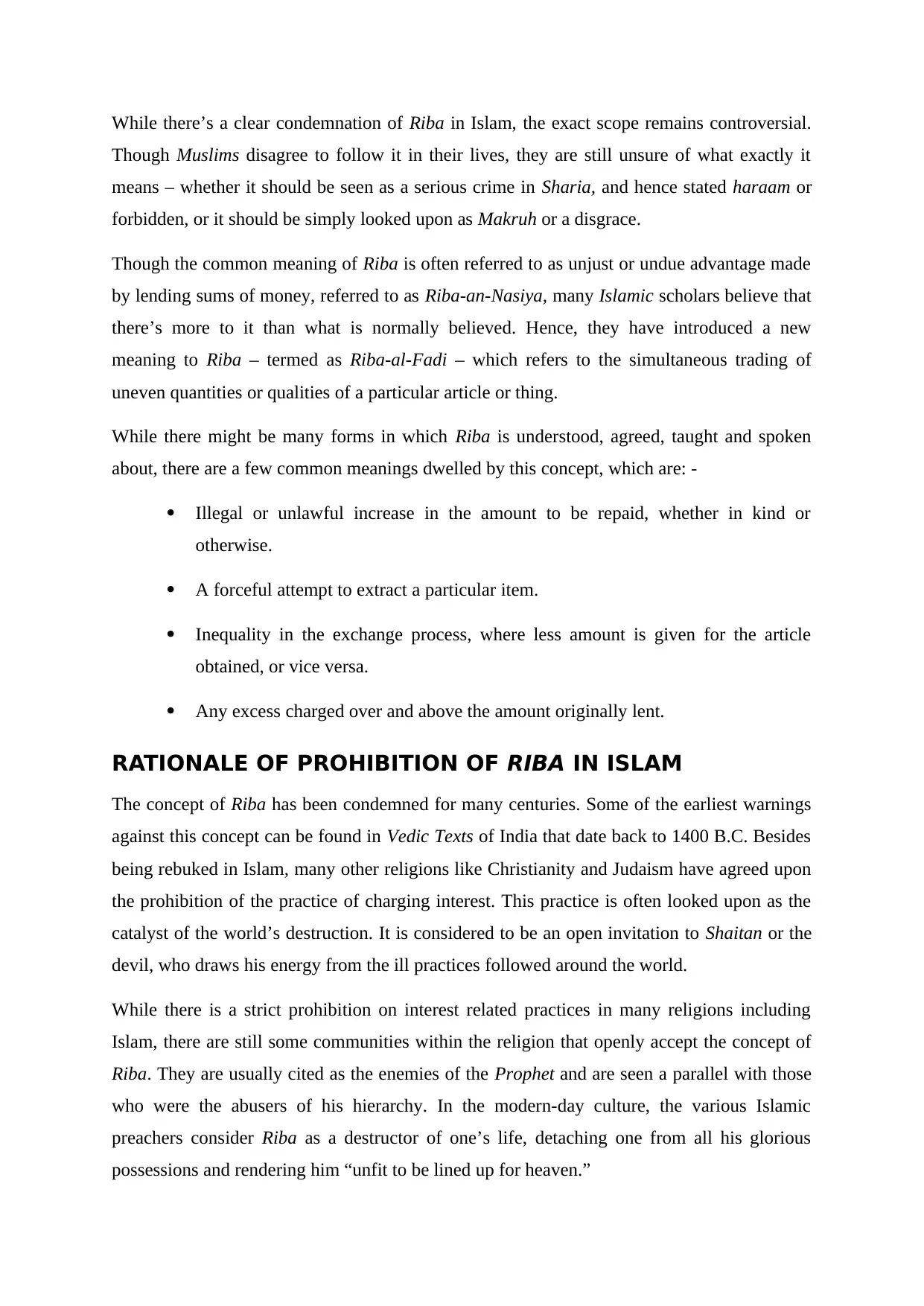
While there’s a clear condemnation of Riba in Islam, the exact scope remains controversial.
Though Muslims disagree to follow it in their lives, they are still unsure of what exactly it
means – whether it should be seen as a serious crime in Sharia, and hence stated haraam or
forbidden, or it should be simply looked upon as Makruh or a disgrace.
Though the common meaning of Riba is often referred to as unjust or undue advantage made
by lending sums of money, referred to as Riba-an-Nasiya, many Islamic scholars believe that
there’s more to it than what is normally believed. Hence, they have introduced a new
meaning to Riba – termed as Riba-al-Fadi – which refers to the simultaneous trading of
uneven quantities or qualities of a particular article or thing.
While there might be many forms in which Riba is understood, agreed, taught and spoken
about, there are a few common meanings dwelled by this concept, which are: -
Illegal or unlawful increase in the amount to be repaid, whether in kind or
otherwise.
A forceful attempt to extract a particular item.
Inequality in the exchange process, where less amount is given for the article
obtained, or vice versa.
Any excess charged over and above the amount originally lent.
RATIONALE OF PROHIBITION OF RIBA IN ISLAM
The concept of Riba has been condemned for many centuries. Some of the earliest warnings
against this concept can be found in Vedic Texts of India that date back to 1400 B.C. Besides
being rebuked in Islam, many other religions like Christianity and Judaism have agreed upon
the prohibition of the practice of charging interest. This practice is often looked upon as the
catalyst of the world’s destruction. It is considered to be an open invitation to Shaitan or the
devil, who draws his energy from the ill practices followed around the world.
While there is a strict prohibition on interest related practices in many religions including
Islam, there are still some communities within the religion that openly accept the concept of
Riba. They are usually cited as the enemies of the Prophet and are seen a parallel with those
who were the abusers of his hierarchy. In the modern-day culture, the various Islamic
preachers consider Riba as a destructor of one’s life, detaching one from all his glorious
possessions and rendering him “unfit to be lined up for heaven.”
Though Muslims disagree to follow it in their lives, they are still unsure of what exactly it
means – whether it should be seen as a serious crime in Sharia, and hence stated haraam or
forbidden, or it should be simply looked upon as Makruh or a disgrace.
Though the common meaning of Riba is often referred to as unjust or undue advantage made
by lending sums of money, referred to as Riba-an-Nasiya, many Islamic scholars believe that
there’s more to it than what is normally believed. Hence, they have introduced a new
meaning to Riba – termed as Riba-al-Fadi – which refers to the simultaneous trading of
uneven quantities or qualities of a particular article or thing.
While there might be many forms in which Riba is understood, agreed, taught and spoken
about, there are a few common meanings dwelled by this concept, which are: -
Illegal or unlawful increase in the amount to be repaid, whether in kind or
otherwise.
A forceful attempt to extract a particular item.
Inequality in the exchange process, where less amount is given for the article
obtained, or vice versa.
Any excess charged over and above the amount originally lent.
RATIONALE OF PROHIBITION OF RIBA IN ISLAM
The concept of Riba has been condemned for many centuries. Some of the earliest warnings
against this concept can be found in Vedic Texts of India that date back to 1400 B.C. Besides
being rebuked in Islam, many other religions like Christianity and Judaism have agreed upon
the prohibition of the practice of charging interest. This practice is often looked upon as the
catalyst of the world’s destruction. It is considered to be an open invitation to Shaitan or the
devil, who draws his energy from the ill practices followed around the world.
While there is a strict prohibition on interest related practices in many religions including
Islam, there are still some communities within the religion that openly accept the concept of
Riba. They are usually cited as the enemies of the Prophet and are seen a parallel with those
who were the abusers of his hierarchy. In the modern-day culture, the various Islamic
preachers consider Riba as a destructor of one’s life, detaching one from all his glorious
possessions and rendering him “unfit to be lined up for heaven.”
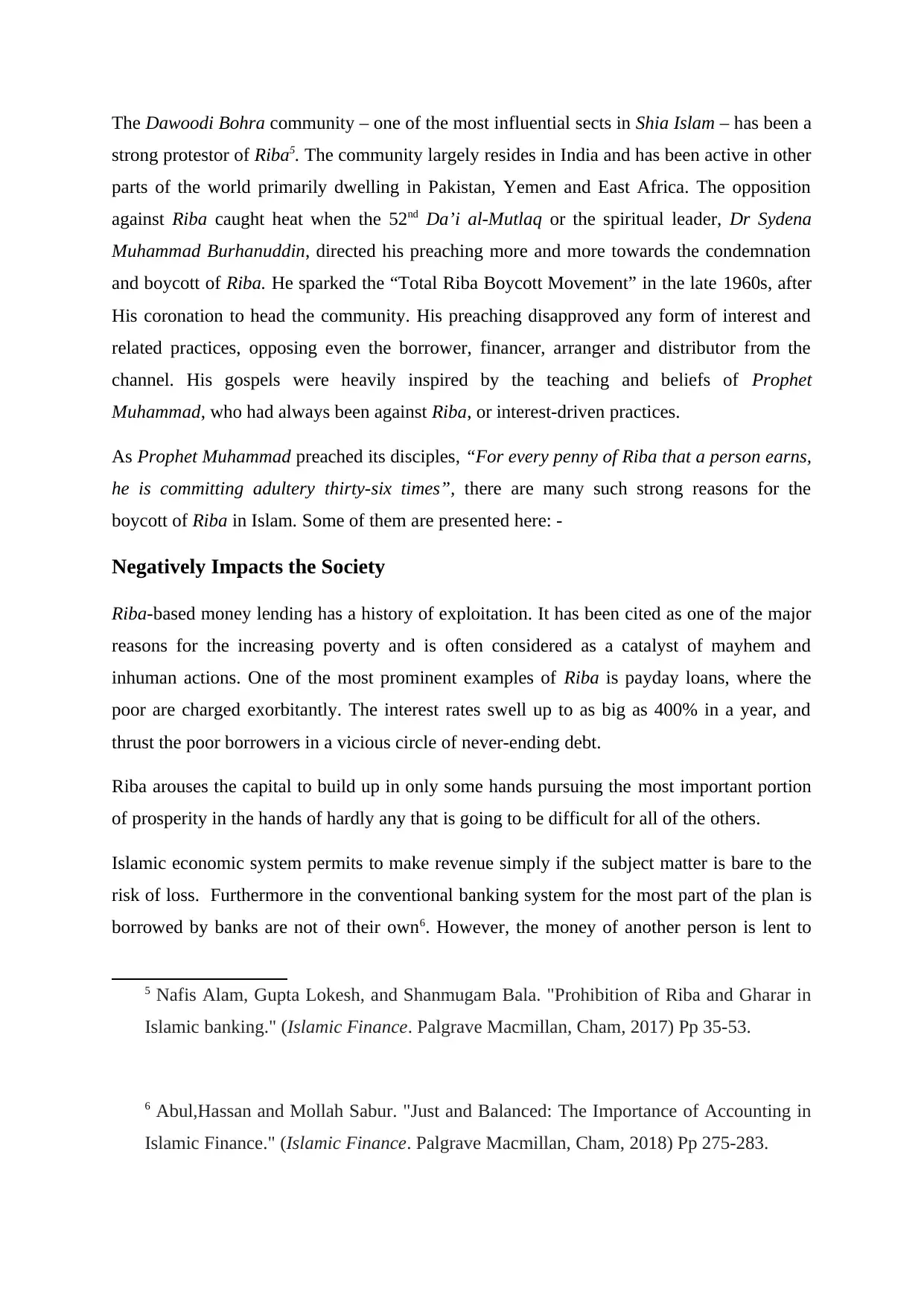
The Dawoodi Bohra community – one of the most influential sects in Shia Islam – has been a
strong protestor of Riba5. The community largely resides in India and has been active in other
parts of the world primarily dwelling in Pakistan, Yemen and East Africa. The opposition
against Riba caught heat when the 52nd Da’i al-Mutlaq or the spiritual leader, Dr Sydena
Muhammad Burhanuddin, directed his preaching more and more towards the condemnation
and boycott of Riba. He sparked the “Total Riba Boycott Movement” in the late 1960s, after
His coronation to head the community. His preaching disapproved any form of interest and
related practices, opposing even the borrower, financer, arranger and distributor from the
channel. His gospels were heavily inspired by the teaching and beliefs of Prophet
Muhammad, who had always been against Riba, or interest-driven practices.
As Prophet Muhammad preached its disciples, “For every penny of Riba that a person earns,
he is committing adultery thirty-six times”, there are many such strong reasons for the
boycott of Riba in Islam. Some of them are presented here: -
Negatively Impacts the Society
Riba-based money lending has a history of exploitation. It has been cited as one of the major
reasons for the increasing poverty and is often considered as a catalyst of mayhem and
inhuman actions. One of the most prominent examples of Riba is payday loans, where the
poor are charged exorbitantly. The interest rates swell up to as big as 400% in a year, and
thrust the poor borrowers in a vicious circle of never-ending debt.
Riba arouses the capital to build up in only some hands pursuing the most important portion
of prosperity in the hands of hardly any that is going to be difficult for all of the others.
Islamic economic system permits to make revenue simply if the subject matter is bare to the
risk of loss. Furthermore in the conventional banking system for the most part of the plan is
borrowed by banks are not of their own6. However, the money of another person is lent to
5 Nafis Alam, Gupta Lokesh, and Shanmugam Bala. "Prohibition of Riba and Gharar in
Islamic banking." (Islamic Finance. Palgrave Macmillan, Cham, 2017) Pp 35-53.
6 Abul,Hassan and Mollah Sabur. "Just and Balanced: The Importance of Accounting in
Islamic Finance." (Islamic Finance. Palgrave Macmillan, Cham, 2018) Pp 275-283.
strong protestor of Riba5. The community largely resides in India and has been active in other
parts of the world primarily dwelling in Pakistan, Yemen and East Africa. The opposition
against Riba caught heat when the 52nd Da’i al-Mutlaq or the spiritual leader, Dr Sydena
Muhammad Burhanuddin, directed his preaching more and more towards the condemnation
and boycott of Riba. He sparked the “Total Riba Boycott Movement” in the late 1960s, after
His coronation to head the community. His preaching disapproved any form of interest and
related practices, opposing even the borrower, financer, arranger and distributor from the
channel. His gospels were heavily inspired by the teaching and beliefs of Prophet
Muhammad, who had always been against Riba, or interest-driven practices.
As Prophet Muhammad preached its disciples, “For every penny of Riba that a person earns,
he is committing adultery thirty-six times”, there are many such strong reasons for the
boycott of Riba in Islam. Some of them are presented here: -
Negatively Impacts the Society
Riba-based money lending has a history of exploitation. It has been cited as one of the major
reasons for the increasing poverty and is often considered as a catalyst of mayhem and
inhuman actions. One of the most prominent examples of Riba is payday loans, where the
poor are charged exorbitantly. The interest rates swell up to as big as 400% in a year, and
thrust the poor borrowers in a vicious circle of never-ending debt.
Riba arouses the capital to build up in only some hands pursuing the most important portion
of prosperity in the hands of hardly any that is going to be difficult for all of the others.
Islamic economic system permits to make revenue simply if the subject matter is bare to the
risk of loss. Furthermore in the conventional banking system for the most part of the plan is
borrowed by banks are not of their own6. However, the money of another person is lent to
5 Nafis Alam, Gupta Lokesh, and Shanmugam Bala. "Prohibition of Riba and Gharar in
Islamic banking." (Islamic Finance. Palgrave Macmillan, Cham, 2017) Pp 35-53.
6 Abul,Hassan and Mollah Sabur. "Just and Balanced: The Importance of Accounting in
Islamic Finance." (Islamic Finance. Palgrave Macmillan, Cham, 2018) Pp 275-283.
⊘ This is a preview!⊘
Do you want full access?
Subscribe today to unlock all pages.

Trusted by 1+ million students worldwide
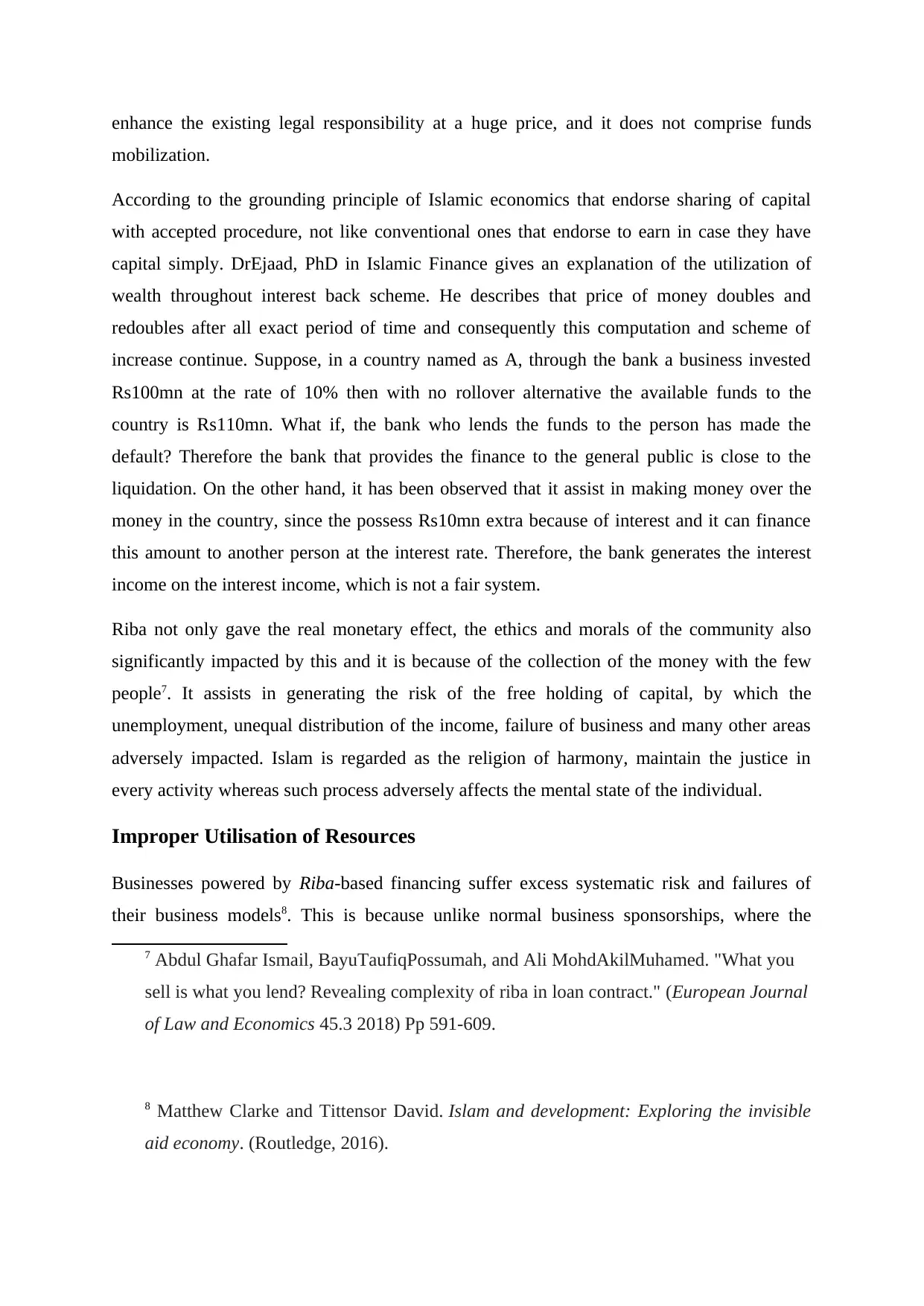
enhance the existing legal responsibility at a huge price, and it does not comprise funds
mobilization.
According to the grounding principle of Islamic economics that endorse sharing of capital
with accepted procedure, not like conventional ones that endorse to earn in case they have
capital simply. DrEjaad, PhD in Islamic Finance gives an explanation of the utilization of
wealth throughout interest back scheme. He describes that price of money doubles and
redoubles after all exact period of time and consequently this computation and scheme of
increase continue. Suppose, in a country named as A, through the bank a business invested
Rs100mn at the rate of 10% then with no rollover alternative the available funds to the
country is Rs110mn. What if, the bank who lends the funds to the person has made the
default? Therefore the bank that provides the finance to the general public is close to the
liquidation. On the other hand, it has been observed that it assist in making money over the
money in the country, since the possess Rs10mn extra because of interest and it can finance
this amount to another person at the interest rate. Therefore, the bank generates the interest
income on the interest income, which is not a fair system.
Riba not only gave the real monetary effect, the ethics and morals of the community also
significantly impacted by this and it is because of the collection of the money with the few
people7. It assists in generating the risk of the free holding of capital, by which the
unemployment, unequal distribution of the income, failure of business and many other areas
adversely impacted. Islam is regarded as the religion of harmony, maintain the justice in
every activity whereas such process adversely affects the mental state of the individual.
Improper Utilisation of Resources
Businesses powered by Riba-based financing suffer excess systematic risk and failures of
their business models8. This is because unlike normal business sponsorships, where the
7 Abdul Ghafar Ismail, BayuTaufiqPossumah, and Ali MohdAkilMuhamed. "What you
sell is what you lend? Revealing complexity of riba in loan contract." (European Journal
of Law and Economics 45.3 2018) Pp 591-609.
8 Matthew Clarke and Tittensor David. Islam and development: Exploring the invisible
aid economy. (Routledge, 2016).
mobilization.
According to the grounding principle of Islamic economics that endorse sharing of capital
with accepted procedure, not like conventional ones that endorse to earn in case they have
capital simply. DrEjaad, PhD in Islamic Finance gives an explanation of the utilization of
wealth throughout interest back scheme. He describes that price of money doubles and
redoubles after all exact period of time and consequently this computation and scheme of
increase continue. Suppose, in a country named as A, through the bank a business invested
Rs100mn at the rate of 10% then with no rollover alternative the available funds to the
country is Rs110mn. What if, the bank who lends the funds to the person has made the
default? Therefore the bank that provides the finance to the general public is close to the
liquidation. On the other hand, it has been observed that it assist in making money over the
money in the country, since the possess Rs10mn extra because of interest and it can finance
this amount to another person at the interest rate. Therefore, the bank generates the interest
income on the interest income, which is not a fair system.
Riba not only gave the real monetary effect, the ethics and morals of the community also
significantly impacted by this and it is because of the collection of the money with the few
people7. It assists in generating the risk of the free holding of capital, by which the
unemployment, unequal distribution of the income, failure of business and many other areas
adversely impacted. Islam is regarded as the religion of harmony, maintain the justice in
every activity whereas such process adversely affects the mental state of the individual.
Improper Utilisation of Resources
Businesses powered by Riba-based financing suffer excess systematic risk and failures of
their business models8. This is because unlike normal business sponsorships, where the
7 Abdul Ghafar Ismail, BayuTaufiqPossumah, and Ali MohdAkilMuhamed. "What you
sell is what you lend? Revealing complexity of riba in loan contract." (European Journal
of Law and Economics 45.3 2018) Pp 591-609.
8 Matthew Clarke and Tittensor David. Islam and development: Exploring the invisible
aid economy. (Routledge, 2016).
Paraphrase This Document
Need a fresh take? Get an instant paraphrase of this document with our AI Paraphraser
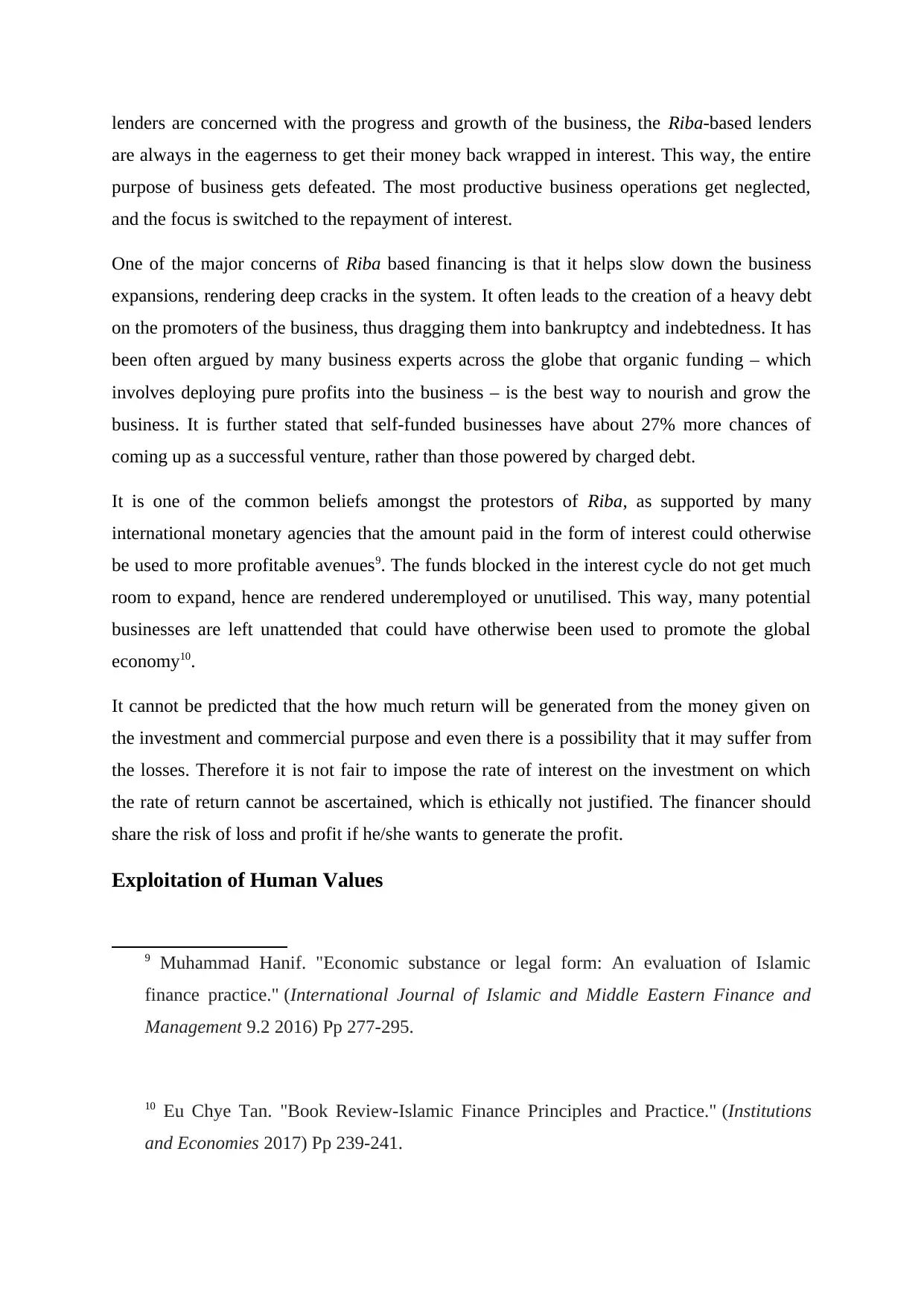
lenders are concerned with the progress and growth of the business, the Riba-based lenders
are always in the eagerness to get their money back wrapped in interest. This way, the entire
purpose of business gets defeated. The most productive business operations get neglected,
and the focus is switched to the repayment of interest.
One of the major concerns of Riba based financing is that it helps slow down the business
expansions, rendering deep cracks in the system. It often leads to the creation of a heavy debt
on the promoters of the business, thus dragging them into bankruptcy and indebtedness. It has
been often argued by many business experts across the globe that organic funding – which
involves deploying pure profits into the business – is the best way to nourish and grow the
business. It is further stated that self-funded businesses have about 27% more chances of
coming up as a successful venture, rather than those powered by charged debt.
It is one of the common beliefs amongst the protestors of Riba, as supported by many
international monetary agencies that the amount paid in the form of interest could otherwise
be used to more profitable avenues9. The funds blocked in the interest cycle do not get much
room to expand, hence are rendered underemployed or unutilised. This way, many potential
businesses are left unattended that could have otherwise been used to promote the global
economy10.
It cannot be predicted that the how much return will be generated from the money given on
the investment and commercial purpose and even there is a possibility that it may suffer from
the losses. Therefore it is not fair to impose the rate of interest on the investment on which
the rate of return cannot be ascertained, which is ethically not justified. The financer should
share the risk of loss and profit if he/she wants to generate the profit.
Exploitation of Human Values
9 Muhammad Hanif. "Economic substance or legal form: An evaluation of Islamic
finance practice." (International Journal of Islamic and Middle Eastern Finance and
Management 9.2 2016) Pp 277-295.
10 Eu Chye Tan. "Book Review-Islamic Finance Principles and Practice." (Institutions
and Economies 2017) Pp 239-241.
are always in the eagerness to get their money back wrapped in interest. This way, the entire
purpose of business gets defeated. The most productive business operations get neglected,
and the focus is switched to the repayment of interest.
One of the major concerns of Riba based financing is that it helps slow down the business
expansions, rendering deep cracks in the system. It often leads to the creation of a heavy debt
on the promoters of the business, thus dragging them into bankruptcy and indebtedness. It has
been often argued by many business experts across the globe that organic funding – which
involves deploying pure profits into the business – is the best way to nourish and grow the
business. It is further stated that self-funded businesses have about 27% more chances of
coming up as a successful venture, rather than those powered by charged debt.
It is one of the common beliefs amongst the protestors of Riba, as supported by many
international monetary agencies that the amount paid in the form of interest could otherwise
be used to more profitable avenues9. The funds blocked in the interest cycle do not get much
room to expand, hence are rendered underemployed or unutilised. This way, many potential
businesses are left unattended that could have otherwise been used to promote the global
economy10.
It cannot be predicted that the how much return will be generated from the money given on
the investment and commercial purpose and even there is a possibility that it may suffer from
the losses. Therefore it is not fair to impose the rate of interest on the investment on which
the rate of return cannot be ascertained, which is ethically not justified. The financer should
share the risk of loss and profit if he/she wants to generate the profit.
Exploitation of Human Values
9 Muhammad Hanif. "Economic substance or legal form: An evaluation of Islamic
finance practice." (International Journal of Islamic and Middle Eastern Finance and
Management 9.2 2016) Pp 277-295.
10 Eu Chye Tan. "Book Review-Islamic Finance Principles and Practice." (Institutions
and Economies 2017) Pp 239-241.
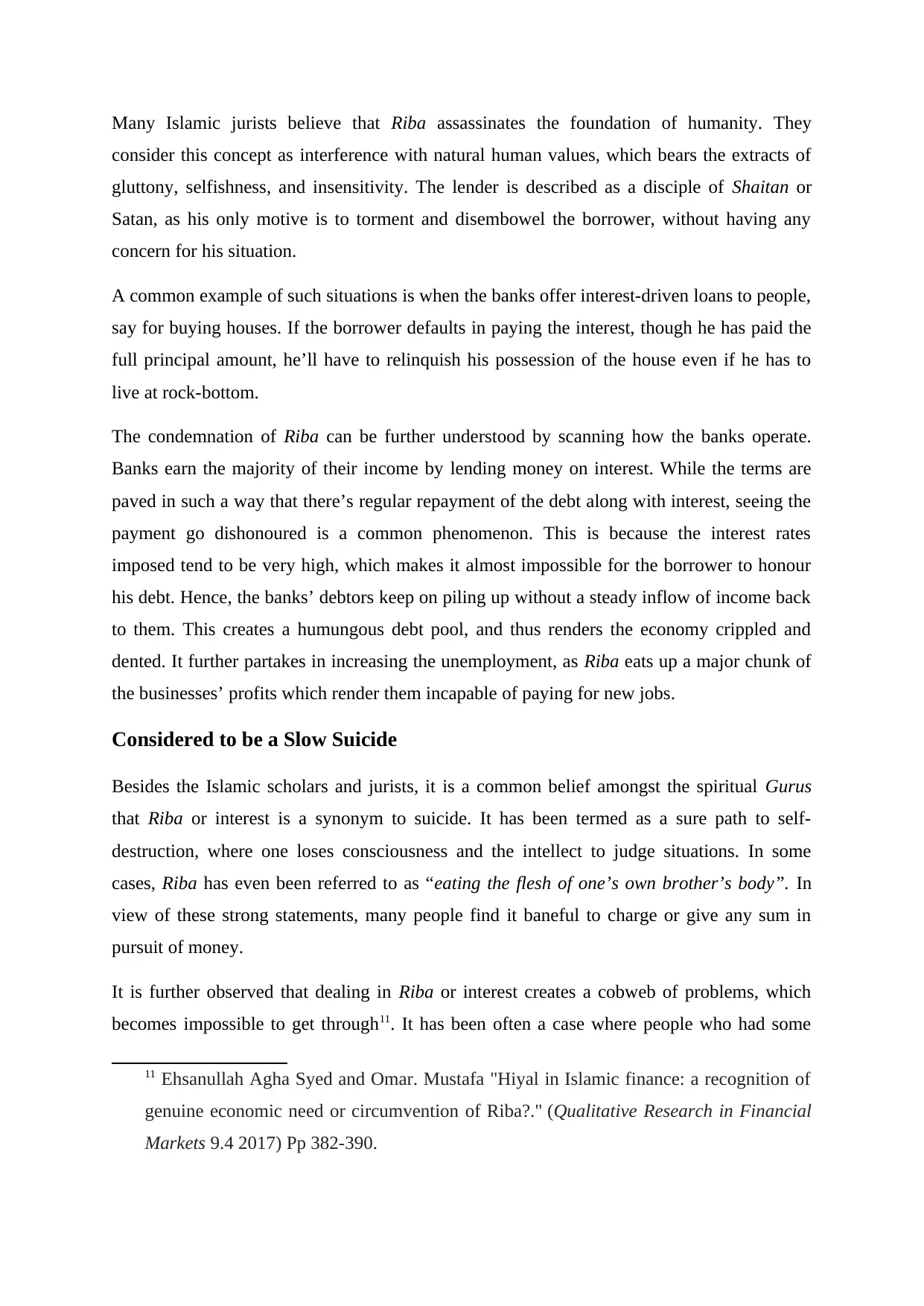
Many Islamic jurists believe that Riba assassinates the foundation of humanity. They
consider this concept as interference with natural human values, which bears the extracts of
gluttony, selfishness, and insensitivity. The lender is described as a disciple of Shaitan or
Satan, as his only motive is to torment and disembowel the borrower, without having any
concern for his situation.
A common example of such situations is when the banks offer interest-driven loans to people,
say for buying houses. If the borrower defaults in paying the interest, though he has paid the
full principal amount, he’ll have to relinquish his possession of the house even if he has to
live at rock-bottom.
The condemnation of Riba can be further understood by scanning how the banks operate.
Banks earn the majority of their income by lending money on interest. While the terms are
paved in such a way that there’s regular repayment of the debt along with interest, seeing the
payment go dishonoured is a common phenomenon. This is because the interest rates
imposed tend to be very high, which makes it almost impossible for the borrower to honour
his debt. Hence, the banks’ debtors keep on piling up without a steady inflow of income back
to them. This creates a humungous debt pool, and thus renders the economy crippled and
dented. It further partakes in increasing the unemployment, as Riba eats up a major chunk of
the businesses’ profits which render them incapable of paying for new jobs.
Considered to be a Slow Suicide
Besides the Islamic scholars and jurists, it is a common belief amongst the spiritual Gurus
that Riba or interest is a synonym to suicide. It has been termed as a sure path to self-
destruction, where one loses consciousness and the intellect to judge situations. In some
cases, Riba has even been referred to as “eating the flesh of one’s own brother’s body”. In
view of these strong statements, many people find it baneful to charge or give any sum in
pursuit of money.
It is further observed that dealing in Riba or interest creates a cobweb of problems, which
becomes impossible to get through11. It has been often a case where people who had some
11 Ehsanullah Agha Syed and Omar. Mustafa "Hiyal in Islamic finance: a recognition of
genuine economic need or circumvention of Riba?." (Qualitative Research in Financial
Markets 9.4 2017) Pp 382-390.
consider this concept as interference with natural human values, which bears the extracts of
gluttony, selfishness, and insensitivity. The lender is described as a disciple of Shaitan or
Satan, as his only motive is to torment and disembowel the borrower, without having any
concern for his situation.
A common example of such situations is when the banks offer interest-driven loans to people,
say for buying houses. If the borrower defaults in paying the interest, though he has paid the
full principal amount, he’ll have to relinquish his possession of the house even if he has to
live at rock-bottom.
The condemnation of Riba can be further understood by scanning how the banks operate.
Banks earn the majority of their income by lending money on interest. While the terms are
paved in such a way that there’s regular repayment of the debt along with interest, seeing the
payment go dishonoured is a common phenomenon. This is because the interest rates
imposed tend to be very high, which makes it almost impossible for the borrower to honour
his debt. Hence, the banks’ debtors keep on piling up without a steady inflow of income back
to them. This creates a humungous debt pool, and thus renders the economy crippled and
dented. It further partakes in increasing the unemployment, as Riba eats up a major chunk of
the businesses’ profits which render them incapable of paying for new jobs.
Considered to be a Slow Suicide
Besides the Islamic scholars and jurists, it is a common belief amongst the spiritual Gurus
that Riba or interest is a synonym to suicide. It has been termed as a sure path to self-
destruction, where one loses consciousness and the intellect to judge situations. In some
cases, Riba has even been referred to as “eating the flesh of one’s own brother’s body”. In
view of these strong statements, many people find it baneful to charge or give any sum in
pursuit of money.
It is further observed that dealing in Riba or interest creates a cobweb of problems, which
becomes impossible to get through11. It has been often a case where people who had some
11 Ehsanullah Agha Syed and Omar. Mustafa "Hiyal in Islamic finance: a recognition of
genuine economic need or circumvention of Riba?." (Qualitative Research in Financial
Markets 9.4 2017) Pp 382-390.
⊘ This is a preview!⊘
Do you want full access?
Subscribe today to unlock all pages.

Trusted by 1+ million students worldwide
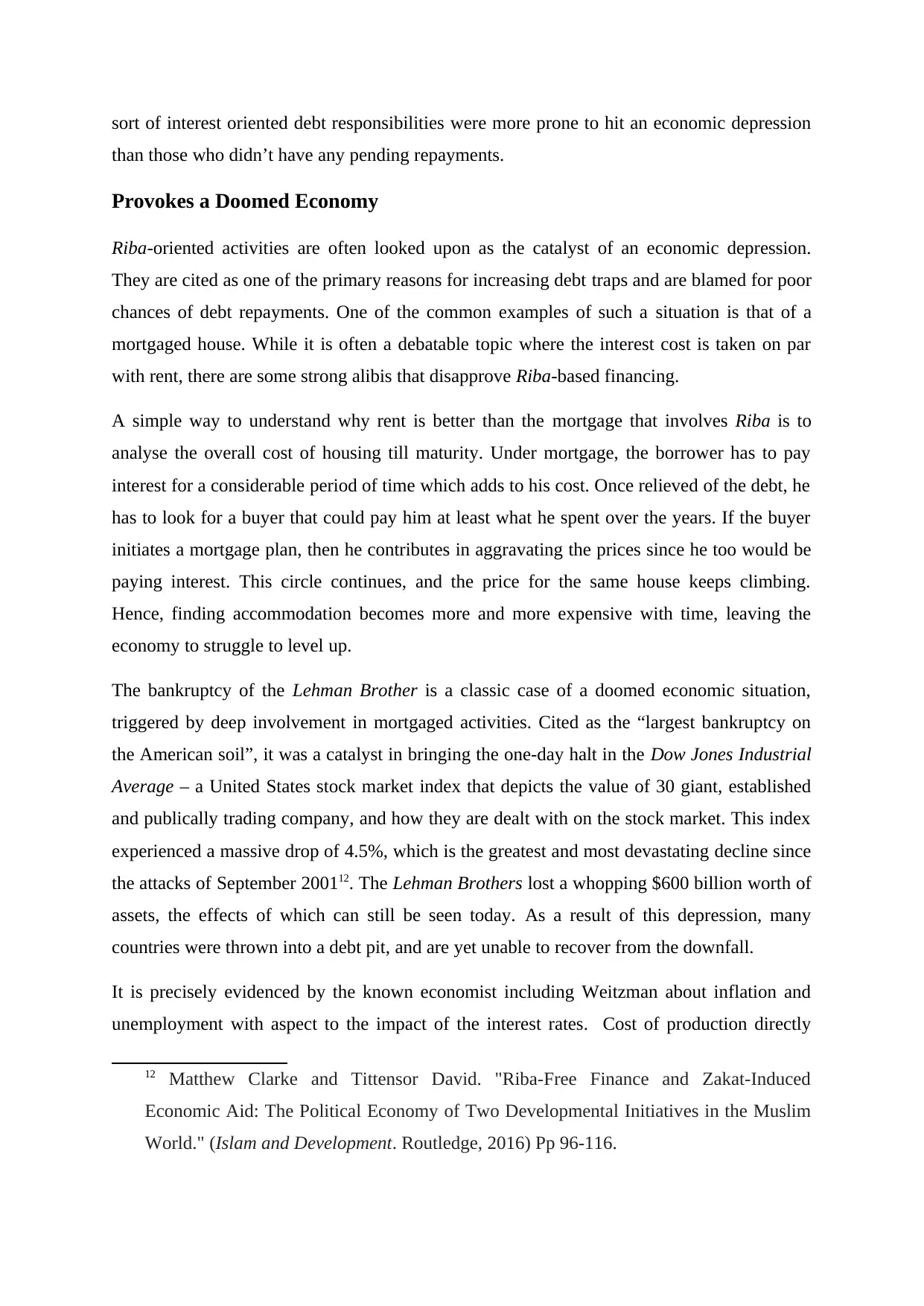
sort of interest oriented debt responsibilities were more prone to hit an economic depression
than those who didn’t have any pending repayments.
Provokes a Doomed Economy
Riba-oriented activities are often looked upon as the catalyst of an economic depression.
They are cited as one of the primary reasons for increasing debt traps and are blamed for poor
chances of debt repayments. One of the common examples of such a situation is that of a
mortgaged house. While it is often a debatable topic where the interest cost is taken on par
with rent, there are some strong alibis that disapprove Riba-based financing.
A simple way to understand why rent is better than the mortgage that involves Riba is to
analyse the overall cost of housing till maturity. Under mortgage, the borrower has to pay
interest for a considerable period of time which adds to his cost. Once relieved of the debt, he
has to look for a buyer that could pay him at least what he spent over the years. If the buyer
initiates a mortgage plan, then he contributes in aggravating the prices since he too would be
paying interest. This circle continues, and the price for the same house keeps climbing.
Hence, finding accommodation becomes more and more expensive with time, leaving the
economy to struggle to level up.
The bankruptcy of the Lehman Brother is a classic case of a doomed economic situation,
triggered by deep involvement in mortgaged activities. Cited as the “largest bankruptcy on
the American soil”, it was a catalyst in bringing the one-day halt in the Dow Jones Industrial
Average – a United States stock market index that depicts the value of 30 giant, established
and publically trading company, and how they are dealt with on the stock market. This index
experienced a massive drop of 4.5%, which is the greatest and most devastating decline since
the attacks of September 200112. The Lehman Brothers lost a whopping $600 billion worth of
assets, the effects of which can still be seen today. As a result of this depression, many
countries were thrown into a debt pit, and are yet unable to recover from the downfall.
It is precisely evidenced by the known economist including Weitzman about inflation and
unemployment with aspect to the impact of the interest rates. Cost of production directly
12 Matthew Clarke and Tittensor David. "Riba-Free Finance and Zakat-Induced
Economic Aid: The Political Economy of Two Developmental Initiatives in the Muslim
World." (Islam and Development. Routledge, 2016) Pp 96-116.
than those who didn’t have any pending repayments.
Provokes a Doomed Economy
Riba-oriented activities are often looked upon as the catalyst of an economic depression.
They are cited as one of the primary reasons for increasing debt traps and are blamed for poor
chances of debt repayments. One of the common examples of such a situation is that of a
mortgaged house. While it is often a debatable topic where the interest cost is taken on par
with rent, there are some strong alibis that disapprove Riba-based financing.
A simple way to understand why rent is better than the mortgage that involves Riba is to
analyse the overall cost of housing till maturity. Under mortgage, the borrower has to pay
interest for a considerable period of time which adds to his cost. Once relieved of the debt, he
has to look for a buyer that could pay him at least what he spent over the years. If the buyer
initiates a mortgage plan, then he contributes in aggravating the prices since he too would be
paying interest. This circle continues, and the price for the same house keeps climbing.
Hence, finding accommodation becomes more and more expensive with time, leaving the
economy to struggle to level up.
The bankruptcy of the Lehman Brother is a classic case of a doomed economic situation,
triggered by deep involvement in mortgaged activities. Cited as the “largest bankruptcy on
the American soil”, it was a catalyst in bringing the one-day halt in the Dow Jones Industrial
Average – a United States stock market index that depicts the value of 30 giant, established
and publically trading company, and how they are dealt with on the stock market. This index
experienced a massive drop of 4.5%, which is the greatest and most devastating decline since
the attacks of September 200112. The Lehman Brothers lost a whopping $600 billion worth of
assets, the effects of which can still be seen today. As a result of this depression, many
countries were thrown into a debt pit, and are yet unable to recover from the downfall.
It is precisely evidenced by the known economist including Weitzman about inflation and
unemployment with aspect to the impact of the interest rates. Cost of production directly
12 Matthew Clarke and Tittensor David. "Riba-Free Finance and Zakat-Induced
Economic Aid: The Political Economy of Two Developmental Initiatives in the Muslim
World." (Islam and Development. Routledge, 2016) Pp 96-116.
Paraphrase This Document
Need a fresh take? Get an instant paraphrase of this document with our AI Paraphraser
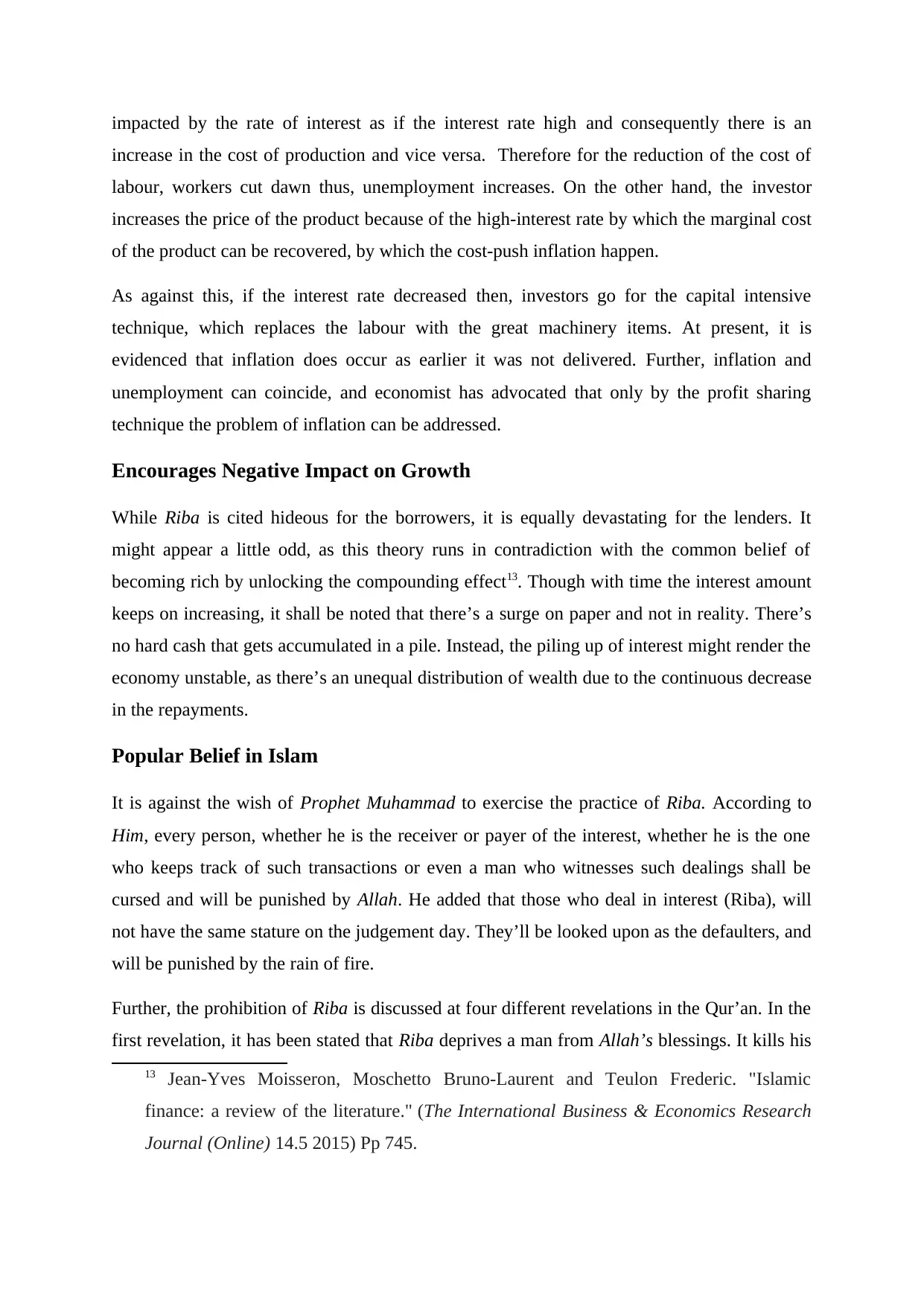
impacted by the rate of interest as if the interest rate high and consequently there is an
increase in the cost of production and vice versa. Therefore for the reduction of the cost of
labour, workers cut dawn thus, unemployment increases. On the other hand, the investor
increases the price of the product because of the high-interest rate by which the marginal cost
of the product can be recovered, by which the cost-push inflation happen.
As against this, if the interest rate decreased then, investors go for the capital intensive
technique, which replaces the labour with the great machinery items. At present, it is
evidenced that inflation does occur as earlier it was not delivered. Further, inflation and
unemployment can coincide, and economist has advocated that only by the profit sharing
technique the problem of inflation can be addressed.
Encourages Negative Impact on Growth
While Riba is cited hideous for the borrowers, it is equally devastating for the lenders. It
might appear a little odd, as this theory runs in contradiction with the common belief of
becoming rich by unlocking the compounding effect13. Though with time the interest amount
keeps on increasing, it shall be noted that there’s a surge on paper and not in reality. There’s
no hard cash that gets accumulated in a pile. Instead, the piling up of interest might render the
economy unstable, as there’s an unequal distribution of wealth due to the continuous decrease
in the repayments.
Popular Belief in Islam
It is against the wish of Prophet Muhammad to exercise the practice of Riba. According to
Him, every person, whether he is the receiver or payer of the interest, whether he is the one
who keeps track of such transactions or even a man who witnesses such dealings shall be
cursed and will be punished by Allah. He added that those who deal in interest (Riba), will
not have the same stature on the judgement day. They’ll be looked upon as the defaulters, and
will be punished by the rain of fire.
Further, the prohibition of Riba is discussed at four different revelations in the Qur’an. In the
first revelation, it has been stated that Riba deprives a man from Allah’s blessings. It kills his
13 Jean-Yves Moisseron, Moschetto Bruno-Laurent and Teulon Frederic. "Islamic
finance: a review of the literature." (The International Business & Economics Research
Journal (Online) 14.5 2015) Pp 745.
increase in the cost of production and vice versa. Therefore for the reduction of the cost of
labour, workers cut dawn thus, unemployment increases. On the other hand, the investor
increases the price of the product because of the high-interest rate by which the marginal cost
of the product can be recovered, by which the cost-push inflation happen.
As against this, if the interest rate decreased then, investors go for the capital intensive
technique, which replaces the labour with the great machinery items. At present, it is
evidenced that inflation does occur as earlier it was not delivered. Further, inflation and
unemployment can coincide, and economist has advocated that only by the profit sharing
technique the problem of inflation can be addressed.
Encourages Negative Impact on Growth
While Riba is cited hideous for the borrowers, it is equally devastating for the lenders. It
might appear a little odd, as this theory runs in contradiction with the common belief of
becoming rich by unlocking the compounding effect13. Though with time the interest amount
keeps on increasing, it shall be noted that there’s a surge on paper and not in reality. There’s
no hard cash that gets accumulated in a pile. Instead, the piling up of interest might render the
economy unstable, as there’s an unequal distribution of wealth due to the continuous decrease
in the repayments.
Popular Belief in Islam
It is against the wish of Prophet Muhammad to exercise the practice of Riba. According to
Him, every person, whether he is the receiver or payer of the interest, whether he is the one
who keeps track of such transactions or even a man who witnesses such dealings shall be
cursed and will be punished by Allah. He added that those who deal in interest (Riba), will
not have the same stature on the judgement day. They’ll be looked upon as the defaulters, and
will be punished by the rain of fire.
Further, the prohibition of Riba is discussed at four different revelations in the Qur’an. In the
first revelation, it has been stated that Riba deprives a man from Allah’s blessings. It kills his
13 Jean-Yves Moisseron, Moschetto Bruno-Laurent and Teulon Frederic. "Islamic
finance: a review of the literature." (The International Business & Economics Research
Journal (Online) 14.5 2015) Pp 745.
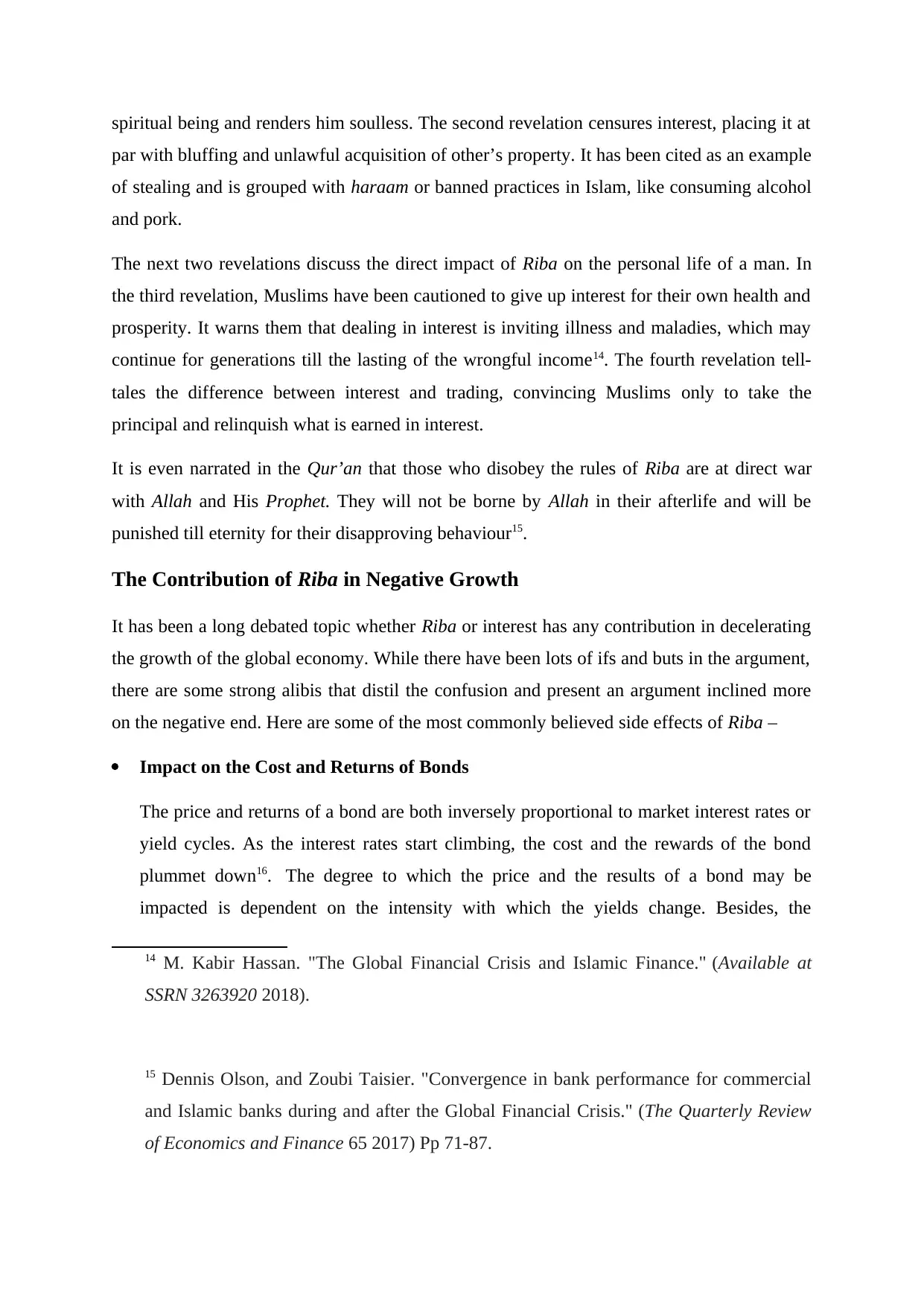
spiritual being and renders him soulless. The second revelation censures interest, placing it at
par with bluffing and unlawful acquisition of other’s property. It has been cited as an example
of stealing and is grouped with haraam or banned practices in Islam, like consuming alcohol
and pork.
The next two revelations discuss the direct impact of Riba on the personal life of a man. In
the third revelation, Muslims have been cautioned to give up interest for their own health and
prosperity. It warns them that dealing in interest is inviting illness and maladies, which may
continue for generations till the lasting of the wrongful income14. The fourth revelation tell-
tales the difference between interest and trading, convincing Muslims only to take the
principal and relinquish what is earned in interest.
It is even narrated in the Qur’an that those who disobey the rules of Riba are at direct war
with Allah and His Prophet. They will not be borne by Allah in their afterlife and will be
punished till eternity for their disapproving behaviour15.
The Contribution of Riba in Negative Growth
It has been a long debated topic whether Riba or interest has any contribution in decelerating
the growth of the global economy. While there have been lots of ifs and buts in the argument,
there are some strong alibis that distil the confusion and present an argument inclined more
on the negative end. Here are some of the most commonly believed side effects of Riba –
Impact on the Cost and Returns of Bonds
The price and returns of a bond are both inversely proportional to market interest rates or
yield cycles. As the interest rates start climbing, the cost and the rewards of the bond
plummet down16. The degree to which the price and the results of a bond may be
impacted is dependent on the intensity with which the yields change. Besides, the
14 M. Kabir Hassan. "The Global Financial Crisis and Islamic Finance." (Available at
SSRN 3263920 2018).
15 Dennis Olson, and Zoubi Taisier. "Convergence in bank performance for commercial
and Islamic banks during and after the Global Financial Crisis." (The Quarterly Review
of Economics and Finance 65 2017) Pp 71-87.
par with bluffing and unlawful acquisition of other’s property. It has been cited as an example
of stealing and is grouped with haraam or banned practices in Islam, like consuming alcohol
and pork.
The next two revelations discuss the direct impact of Riba on the personal life of a man. In
the third revelation, Muslims have been cautioned to give up interest for their own health and
prosperity. It warns them that dealing in interest is inviting illness and maladies, which may
continue for generations till the lasting of the wrongful income14. The fourth revelation tell-
tales the difference between interest and trading, convincing Muslims only to take the
principal and relinquish what is earned in interest.
It is even narrated in the Qur’an that those who disobey the rules of Riba are at direct war
with Allah and His Prophet. They will not be borne by Allah in their afterlife and will be
punished till eternity for their disapproving behaviour15.
The Contribution of Riba in Negative Growth
It has been a long debated topic whether Riba or interest has any contribution in decelerating
the growth of the global economy. While there have been lots of ifs and buts in the argument,
there are some strong alibis that distil the confusion and present an argument inclined more
on the negative end. Here are some of the most commonly believed side effects of Riba –
Impact on the Cost and Returns of Bonds
The price and returns of a bond are both inversely proportional to market interest rates or
yield cycles. As the interest rates start climbing, the cost and the rewards of the bond
plummet down16. The degree to which the price and the results of a bond may be
impacted is dependent on the intensity with which the yields change. Besides, the
14 M. Kabir Hassan. "The Global Financial Crisis and Islamic Finance." (Available at
SSRN 3263920 2018).
15 Dennis Olson, and Zoubi Taisier. "Convergence in bank performance for commercial
and Islamic banks during and after the Global Financial Crisis." (The Quarterly Review
of Economics and Finance 65 2017) Pp 71-87.
⊘ This is a preview!⊘
Do you want full access?
Subscribe today to unlock all pages.

Trusted by 1+ million students worldwide
1 out of 21
Related Documents
Your All-in-One AI-Powered Toolkit for Academic Success.
+13062052269
info@desklib.com
Available 24*7 on WhatsApp / Email
![[object Object]](/_next/static/media/star-bottom.7253800d.svg)
Unlock your academic potential
Copyright © 2020–2026 A2Z Services. All Rights Reserved. Developed and managed by ZUCOL.





